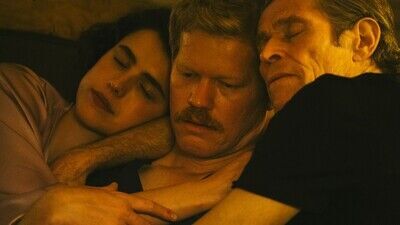“Universal Language,” debuting as part of the Director’s Fortnight selection, is a quiet yet bleakly humourous look at Rankin’s hometown, shooting it with the precision of a Wes Anderson and the sardonic bleakness of Tarkovsky. We’re thrust into a kind of Mxyzptlkian world where Farsi is the dominant language of Manitoba, Métis leader (and founder of Manitoba) Louis Riel appears on the currency, and Quebec is little more than a Soviet-style bureaucratic hellscape.
This is a city where Kleenex boxes are currency, earmuffs are a form of PPE, and turkeys wander the street in somewhat seductive ways. Rankin himself stars as Matthew, a nebbish of a man who quits his job with the province of Quebec to return home to visit his mother. Negin (Rojina Esmaeili) and Nazgol (Saba Vahedyousefi) are students in a French immersion class who, after finding one of those Riel notes buried in ice, seek out an axe to free it to pay for new glasses for Omid (Sobhan Javadi), who lost his when one of those turkeys ran off with his pair. Then there’s Massoud (Pirouz Nemati), the local tour guide who takes visitors to local highway interchanges or a bench where a briefcase was once left.

Superficially, one may think of this as weird for weirdness’s sake. But like the grand constructions of Jacques Tati or the somewhat somber whimsy of Jacques Demy, “Universal Language” manages to provide some pretty profound commentary. There are obvious reflections on the Canadian multicultural mosaic. Still, in deeper ways, it reflects the prosaic architecture of the prairie town, the beige and grey-bricked buildings forming angular pathways that seem as forlorn as they are aimless.
While “Rumours” calls forth Winnipeg-raised Neil Young for its poetry, native sons The Guess Who buttress Rankin’s tale, “These Eyes,” proving the perfect baroque ornamentation for this off-kilter yet inviting world. As characters wander streets and narratives intersect, a huge amount of warmth is revealed within the frozen setting; the end result is a truly sublime bit of surrealist satisfaction.
Beyond the glitzy red carpets and beach parties, many nonfiction films vie for audience attention at the fest. While some, like Ron Howard’s Muppeteer doc “Jim Henson: Idea Man” and Oliver Stone’s “Lula” about the left-wing Brazilian president, get much of the attention thanks to their Hollywood directors, there are many other, quieter films absolutely deserving of notice.
One of these is “Belle de Gaza,” a supremely timely, if likely controversial, look at the transgender and sex worker communities in Tel Aviv. These are real people telling their stories, and given all that’s going on in the world, it’s a discussion that many are not ready to engage in truly, given much of the intransigence witnessed by many following the events over the last several months in the region.

